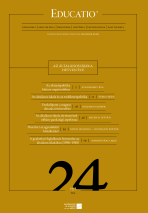Az általános iskola és az emlékezetpolitika
The Primary School and the Politics of Memory – The Soviet Scenario and the Nation’s Educators
Author(s): Géza SáskaSubject(s): Education, Political history, School education, History of Education, WW II and following years (1940 - 1949), Post-War period (1950 - 1989), History of Communism
Published by: Akadémiai Kiadó
Keywords: 8 grades primary school; the 1945 transition; remembrance policy; education policy; Soviet influence;
Summary/Abstract: The primary school was considered to be democratic in terms of social equality, though with suppressed freedom. It was not widely discussed that every Communist party in countries in the Soviet sphere in Europe had kept to the same policy in their coming to power. All of them made efforts to set up unified, primary school-based education systems to attract disregarded teachers working in basic education; and they also promised to raise the social standing of undereducated people. It was forgotten that teachers from the pre-war period – persons who carried a mixed baggage of racist, nationalistic attitudes and social sensitivities – went on to play a key role in school reform, in coalition with people coming with the Red Army; though from this 1948-1950 period, all such groups have been marginalized in public life and eliminated from social memory and, ultimately, from history.
Journal: Educatio
- Issue Year: 24/2015
- Issue No: 4
- Page Range: 11-35
- Page Count: 25
- Language: Hungarian

